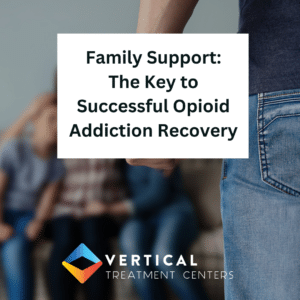
Family Support: The Key to Successful Opioid Addiction Recovery
Opioid addiction not only affects the individual struggling with the addiction but also impacts their loved ones. Family members can play a critical role in the recovery process by providing necessary support, encouragement, and compassion. In this blog post, we will explore the importance of family support in opioid addiction recovery and discuss strategies for families to provide the best possible support for their loved ones.
The Importance of Family Support in Opioid Addiction Recovery
Family support is a crucial component of successful opioid addiction recovery. It can help individuals feel loved, valued, and motivated to stay committed to the recovery process. Family support can also improve mental health outcomes, reduce substance use triggers, and prevent relapse.
Family Dynamics and Substance Abuse
- Enabling: Enabling refers to unintentional behaviors that inadvertently encourage or support substance abuse. These behaviors may include covering up for the addicted person, tolerating their behavior, or continuing to provide financial support.
- Codependency: Codependency is a condition that often co-occurs with addiction. It refers to the unhealthy relationship between a person with addiction and their family members characterized by excessive caretaking and enabling.
Strategies for Providing Family Support
- Educate Yourself: Learn about opioid addiction, how it affects the brain and body, and the available treatment options. Educating yourself can help you understand the challenges and develop a realistic approach to supporting your loved one.
- Communication: Open and honest communication is essential in providing family support. Create a space where your loved one can share their thoughts and feelings without fear of judgment or shame. Effective communication can encourage trust, mutual respect, and collaboration between family members.
- Set Boundaries: Setting healthy boundaries is essential in maintaining a supportive environment while avoiding enabling behaviors. Establish clear expectations about substance use and communicate consequences for violations while providing consistent support and encouragement.
- Engage in Self-Care: Caring for a loved one during opioid addiction recovery can be challenging and emotionally draining. Engage in self-care practices that promote your mental and physical well-being, including meditation, exercise, therapy, and social support.
Combining Family Support with Professional Treatment
Family support can be a critical part of the recovery process, but it should be integrated with professional treatment. Family members can work with addiction professionals to develop effective treatment plans that incorporate family support and therapy. Professional treatment can provide the necessary resources, medication, and therapy to support the recovery process.
Celebrating Success and Embracing Hope
Recovery from opioid addiction is a long and challenging journey that requires patience, commitment, and support. Celebrating small achievements, milestones, and goals can help build momentum and maintain motivation. Embracing hope and positive thinking can help individuals and their families stay committed to a brighter future.
Conclusion
Family support is integral to successful opioid addiction recovery. By educating yourself, setting boundaries, engaging in self-care, and integrating family support with professional treatment, you can play a crucial role in the recovery process. Celebrating success and embracing hope can help individuals and their families stay committed to a brighter future.